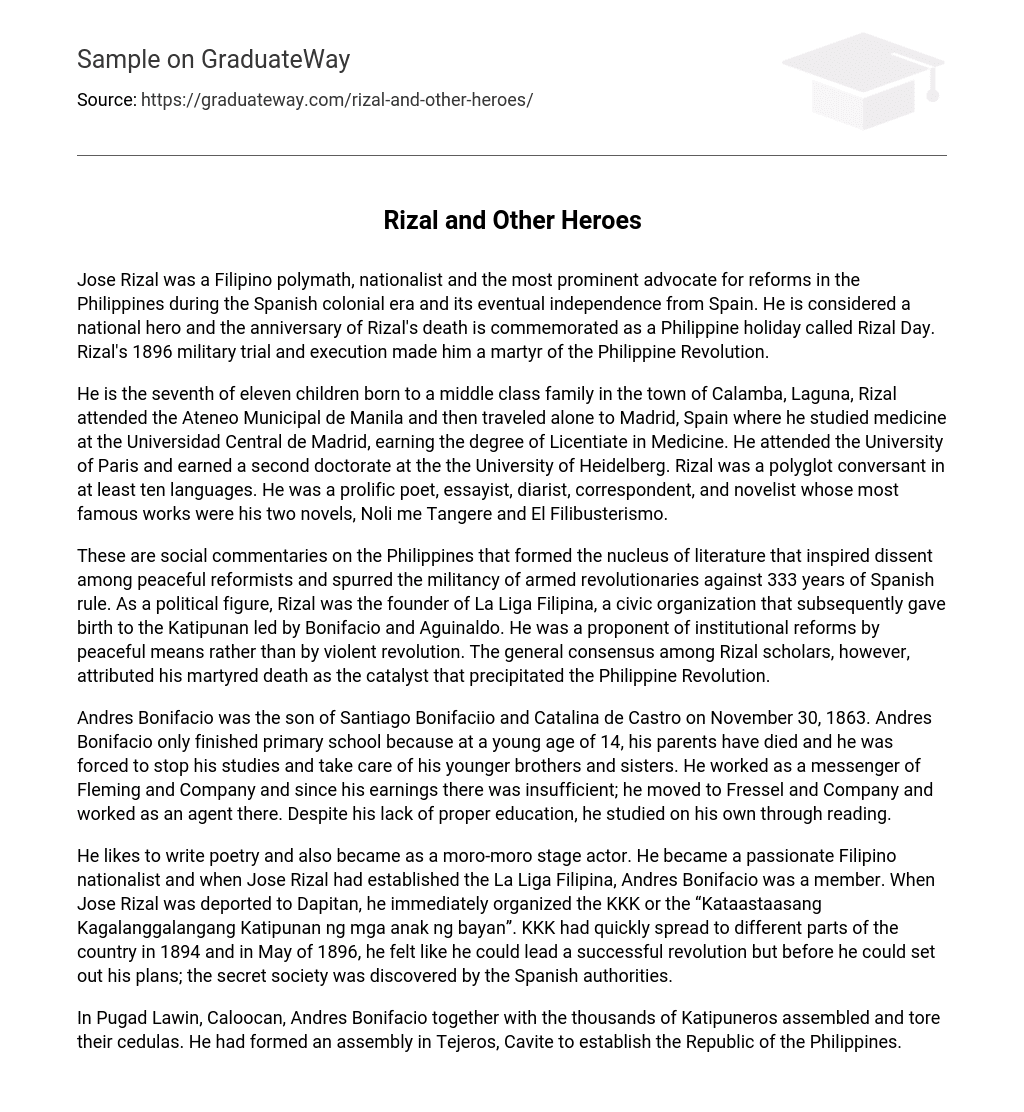Jose Rizal was a Filipino polymath, nationalist and the most prominent advocate for reforms in the Philippines during the Spanish colonial era and its eventual independence from Spain. He is considered a national hero and the anniversary of Rizal’s death is commemorated as a Philippine holiday called Rizal Day. Rizal’s 1896 military trial and execution made him a martyr of the Philippine Revolution.
He is the seventh of eleven children born to a middle class family in the town of Calamba, Laguna, Rizal attended the Ateneo Municipal de Manila and then traveled alone to Madrid, Spain where he studied medicine at the Universidad Central de Madrid, earning the degree of Licentiate in Medicine. He attended the University of Paris and earned a second doctorate at the the University of Heidelberg. Rizal was a polyglot conversant in at least ten languages. He was a prolific poet, essayist, diarist, correspondent, and novelist whose most famous works were his two novels, Noli me Tangere and El Filibusterismo.
These are social commentaries on the Philippines that formed the nucleus of literature that inspired dissent among peaceful reformists and spurred the militancy of armed revolutionaries against 333 years of Spanish rule. As a political figure, Rizal was the founder of La Liga Filipina, a civic organization that subsequently gave birth to the Katipunan led by Bonifacio and Aguinaldo. He was a proponent of institutional reforms by peaceful means rather than by violent revolution. The general consensus among Rizal scholars, however, attributed his martyred death as the catalyst that precipitated the Philippine Revolution.
Andres Bonifacio was the son of Santiago Bonifaciio and Catalina de Castro on November 30, 1863. Andres Bonifacio only finished primary school because at a young age of 14, his parents have died and he was forced to stop his studies and take care of his younger brothers and sisters. He worked as a messenger of Fleming and Company and since his earnings there was insufficient; he moved to Fressel and Company and worked as an agent there. Despite his lack of proper education, he studied on his own through reading.
He likes to write poetry and also became as a moro-moro stage actor. He became a passionate Filipino nationalist and when Jose Rizal had established the La Liga Filipina, Andres Bonifacio was a member. When Jose Rizal was deported to Dapitan, he immediately organized the KKK or the “Kataastaasang Kagalanggalangang Katipunan ng mga anak ng bayan”. KKK had quickly spread to different parts of the country in 1894 and in May of 1896, he felt like he could lead a successful revolution but before he could set out his plans; the secret society was discovered by the Spanish authorities.
In Pugad Lawin, Caloocan, Andres Bonifacio together with the thousands of Katipuneros assembled and tore their cedulas. He had formed an assembly in Tejeros, Cavite to establish the Republic of the Philippines. Emilio Aguinaldo was elected as the first president of the Philippines while Andres Bonifacio was elected as Secretary of the Interior. Since he did not have a good educational background, his qualifications were questioned by Daniel Tirona. He was offended by this and declared the election to be void. He then moved to Naic, Cavite to create his own government and formed his own army.
While Andres Bonifacio was in Naic, Emilio Aguinaldo and his forces gained more success and control over some towns. When Andres Bonifacio left Naic, Emilio Aguinaldo ordered for his arrest but Bonifacio resisted the arrest and he was tried in court and was sentenced to death by the military tribunal. Andres Bonifacio was executed in Maragondon, Cavite by Emilio Aguinaldo’s men on May 10, 1897. Today, Andres Bonifacio is being regarded as a National Hero and Bonifacio Day is being celebrated every 30th of November in honor of his heroism.
Apolinario Mabini was a Filipino political philosopher and revolutionary. He wrote the constitution for the first Philippine republic of 1899-1901 and served as the first prime minister in 1899. He has been called the Brains of the Revolution. Another moniker is “the Sublime Paralytic” because he was paralyzed by polio. His most popular work is his Decalogue for Filipinos. Emilio Jacinto, who gave light to the Katipunan, was born in Trozo, Manila to Mariano Jacinto, a bookkeeper, and Josefa Dizon. Despite the family’s acute financial conditions, Jacinto received a good education.
In 1894, at the age of 19, he joined the Katipunan where Bonifacio befriended him. To Bonifacio, Jacinto was the “Soul of the society. ” In the Katipunan elections of December 31, 1895, Jacinto, only a pre-law student in the University of Santo Tomas, was elected fiscal or number two man in the Supreme Council. His enthusiasm, ideals and spirit soon guided the course of the secret revolutionary society. He wrote the Kartilya ng Katipunan (Primer of the Katipunan), and the oath of membership, which served as guiding principles of the Katipuneros.
CONCLUSION: Rizal, Bonifacio, Mabini and Jacinto were all Filipino leaders, nationalists, political and social commentators who helped our country to rise and to build our own nation and culture. They considered to be a “rare comet” who indeed shines as a guiding stars for us students. They were an individual, Malayan, who embodied a noble spirit and a great mind who used it for the liberation of the powerless and poor. They enhance the hope of inspiring others to imitate they great and passionate drive.





